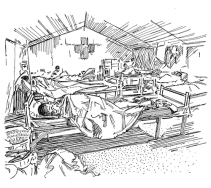01. Community-based surveillance
01. Community-based surveillance
Last update: 2025-06-16
Overview
- Community-based surveillance is the systematic detection and reporting of significant public health events (such as sudden illness or death in people or animals) within a community by community members and volunteers. It is a simple, adaptable, low-cost public health initiative designed to complement early warning systems for potential epidemic diseases.
- Volunteers use something called a “community-case definition” to detect and report signs and symptoms of potential diseases, health risks and events, and support in community actions and response of local health authorities. Community case definitions are designed to align with the local language and do not require medical training to report on.
- Information discovered during surveillance should be shared with the local branch and health authorities based on the agreed protocol. Where relevant, (e.g. for zoonoses or environmental health events) information should also be shared with animal health and environmental health authorities.
- Community-based surveillance (CBS) can be done alongside other health, WASH or community engagement activities in your community, and therefore is not a stand-alone activity, but one that is useful to partner with other community-based activities.
- Community-based surveillance aids in
- Early detection of public health risks within the community
- Complementing early warning systems, extending them to the community
- Linking early detection to early action within the community
What to do and how to do it
- Preparation activities
- Work with supervisors in mapping community needs and human, animal and environmental disease priorities (see Action tool Community mapping)
- Familiarize yourself with the disease that may be present in your community including signs and symptoms
- Establish who is vulnerable in the community. Doing this will help you to identify people who are more likely to fall sick
- Ensure referral mechanisms are clear in case community members fall sick and require referrals to health facilities for care.
- Engage in community engagement activities such as mobile cinema, house-to-house visits, etc. to remain active and a known resource in the community.
- Recognize
- Detect signs and symptoms corresponding to human, animal or environmental health risks or events in your community aligned with community case definitions
- When you detect people who are sick with the disease, assess how severely ill they are and whether they need to be referred to a health facility (see Action tool Referral to health facilities).
- Record the health risk or event you detected to ensure it can be followed-up
- Report
- Report on the detected health risks or event in your community to your supervisor based on the methodology you are trained on (for example, SMS, phone call, or mobile application). Remember that reporting must be systematic. To avoid confusion, everyone who reports should follow the same methods agreed on in the protocol and in the training.
- Your supervisor will then cross-check the report ensuring it meets the community case definition or unusual event requirements agreed on with health authorities. If matching, the supervisor will escalate the alert to the local health authorities for a response or investigation
- After verification, the supervuisor will notify relevant authorities in animal and environmental health for significant animal, zoonotic and environmental health events, especially those that portend a risk to human health.
- React
- Begin community-level activities based on the health risk following proper safety precautions
- Referral or care at home
- Communicate specific health messages and information, and refer sick people promptly to health facilities
- If sick people can be cared for at home, show their families what to do and provide them with information and supplies, where possible. Use corresponding “volunteer actions” in the ECV toolkit corresponding to the suspected epidemic risk.
- Support health authorities in their investigation or response following-up on the alert
- Where relevant, collaborate with and support officials in the animal and environmental health sectors for joint investigation, response and information sharing.
Additional resources on community-based surveillance: https://cbs.ifrc.org/
